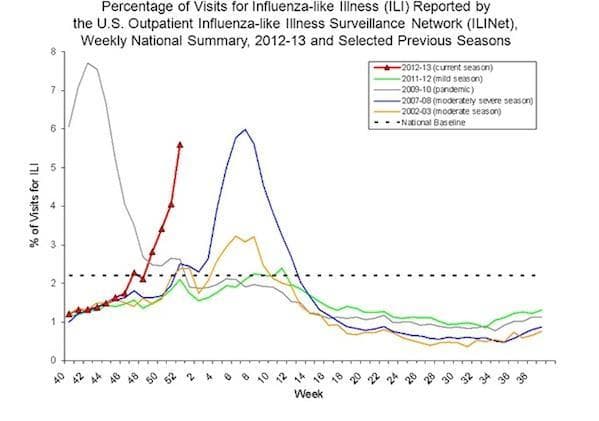Advertisement
Doctor's Dispatch: Three Unusual Aspects Of This Year's Early Flu

The flu is hitting early and hard this year in Massachusetts and elsewhere.
We share the official data as it comes out. (See that rocketing red 2013 line in the CDC chart above.) But now for a fresh dispatch from the medical trenches — that is to say, in this case, the infectious diseases division of Mount Auburn Hospital. Dr. Robin Colgrove, a virologist by training, underscores that he's passing along purely anecdotal reports — but they may provide early warning for both doctors and patients. We spoke today; his observations, lightly edited:
Clearly we're seeing a lot more flu a lot earlier than we usually do. A few other things are unusual this year.
1. Despite the vaccine
It seems to us that we’re seeing more confirmed cases of influenza, using the rapid antigen test, in people who’ve been vaccinated than we would normally see. I was speaking about this at grand rounds the other day and among the primary care doctors in the audience, a number were saying the same thing.

Those cases have been mostly mild cases and it may be they have partial protection from the vaccine. (Flu vaccine efficacy has been controversial among researchers for quite some time. In ideal conditions with young healthy people, it may be 80-90 percent effective, but when epidemiologists look at the real world, the numbers have been much lower, maybe 50-60 percent efficacy.) Even in the best years, some people who get vaccinated also get influenza, but they are probably less likely to have severe and prolonged illness.
2. Atypical symptoms
A related point: There seem to be more people this year with atypical symptoms. Clinicians tend to be good at identifying flu: an abrupt high fever and severe malaise, and upper and lower respiratory symptoms. That pattern in the middle of a flu outbreak is almost always flu. Now we're seeing people [who test positive for flu] with no high fever, maybe scratchy throats, possible gastro-intestinal symptoms.
It's too early to know what this means, but it's a real problem for primary care doctors who would normally be able to say, 'You don't have the flu.' And it's less of an issue for the patients themselves who are not that sick, and can just go home, drink chicken soup and watch TV. What we don't know is the risk those people might pose to the traditionally vulnerable populations. This person who has just a sniffle and thinks it's a cold, if they go and visit Grandma in the ICU, could they kill her?
3. Prolonged misery
And the third pattern I find I'm being asked about: People who have what sounds like an initial bout of flu and then prolonged illness for weeks. And that shouldn't happen — there are only a very small number of viruses and no respiratory viruses that go on for weeks.
Classically, we worry about bacterial pneumonia: You get the flu, you're getting better on days 6, 7 and 8, then get worse at days 8, 9 and 10. But with this new pattern, you get a febrile illness, your fever goes down and then you continue to cough and feel lousy for weeks. We don't know what that is, but there's more of that this year. One possibility is that though there are, broadly speaking, no chronic respiratory infections of normal lungs, you can have chronic infection in the sinuses; so some people may have had the flu and developed smouldering sinus infections whose dripping also causes coughing.
A final note about following flu statistic: One thing that is known historically is that there is a real effect of rumors on epidemics; they can make them worse. There's abundant evidence that misinformation during the Spanish flu caused a lot of problems. In the Internet era, this is a particular problem, so I advise people to consult the CDC and the WHO, and more or less ignore everyone else.
Readers, does this jibe with your experience? I definitely have the sense that for many people, this will go down as The Winter Of The Endless Cough...
This program aired on January 7, 2013. The audio for this program is not available.
